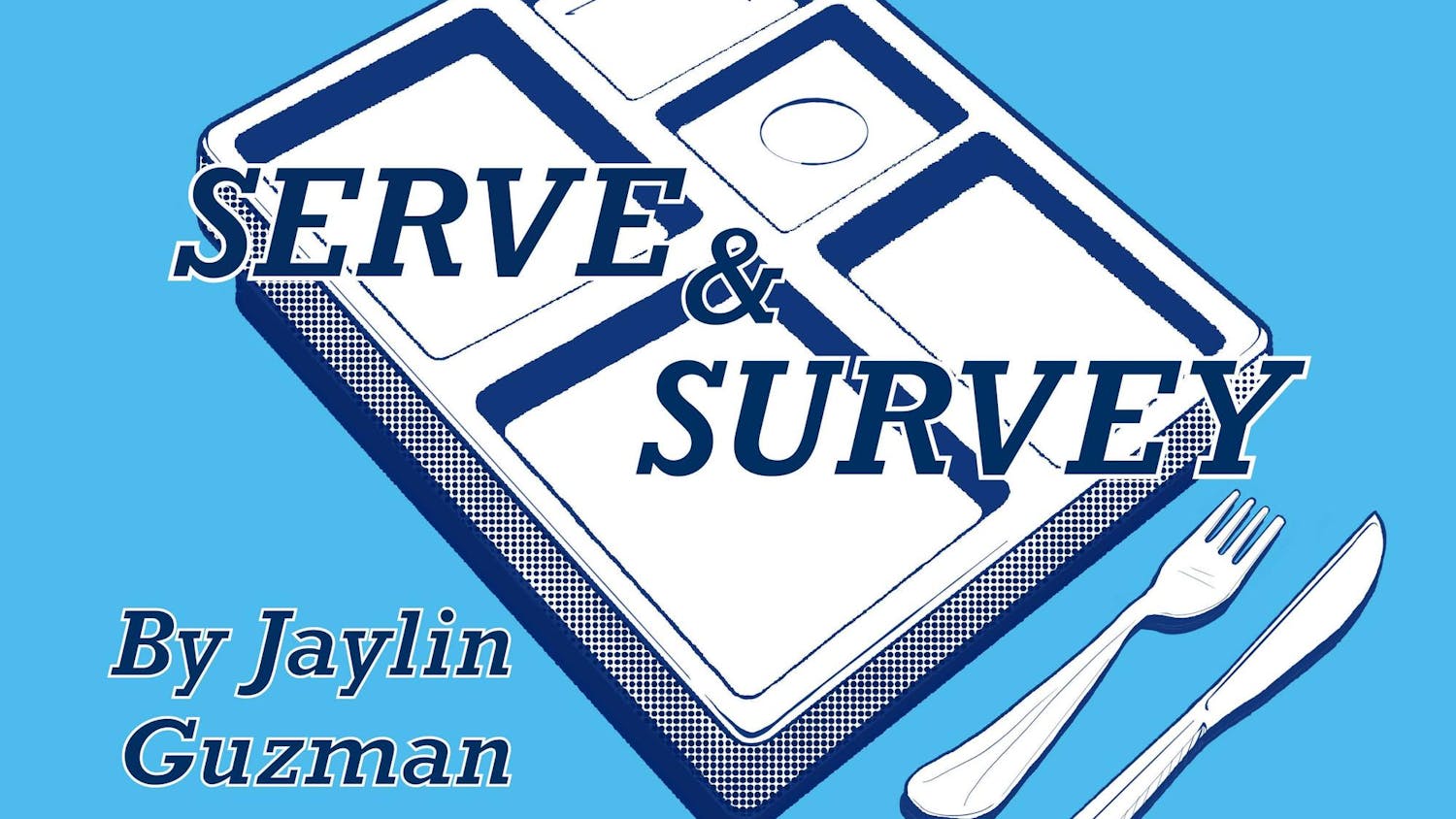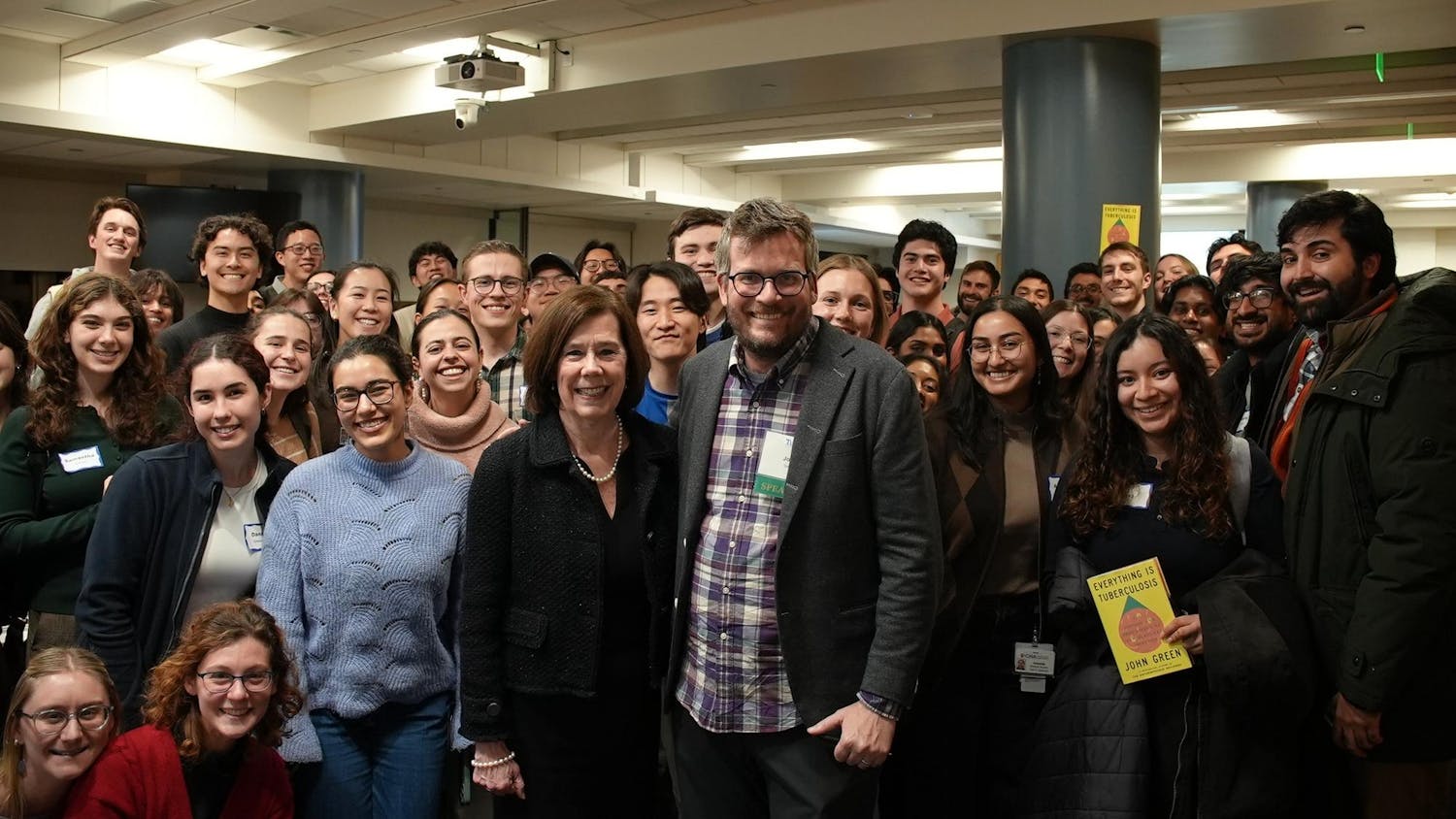Student-teachers and business partners Marcy Regalado and McCall Bliss had a revelation one day: “What if we teach what we’re doing?”
According to Regalado, this idea led to an in-class application of their work as entrepreneurs.
Bliss and Regalado, both seniors, taught their first Explorations class “From Brainstorm to Business” this fall semester. The class allowed first-year students to get a taste of the entrepreneurial skills and spirit that have inspired their two student-teachers.
According to Bliss, the idea for the class was an extension of the work they were already doing for the business that they started, lohtuslabs, an in-house incubator for start-ups.
"[Being] an in-house incubator ... means that we have all of these ideas from within, and we developed them [to] see if they’re actual opportunities and then expand them out," Bliss said. "[This] is a little bit different from a traditional start-up incubator, which take ideas from outside and brings them in … [The class] was an experiment to see if that would actually work by bringing in others students, having them come up with ideas, see if there were actually opportunities, and then send them out and see if they actually wanted to keep working on them outside of our class.”
According to Bliss and Regalado, the class is based around three goals: to recognize problems and formulate solutions; to collaborate with others and share opinions; and finally, to be confident in self-advocacy. According to Regalado, all of these goals are valuable for business and life. The final goal, which she described as the “entrepreneurial spirit,” creates a mentality that is vital for all types of work within or outside of business.
Although these goals may not stray far from the average Entrepreneurial Leadership Studies (ELS) class at Tufts, what differentiates their class from other business classes is the ExCollege learning environment and the early exposure first-year students get in entrepreneurship, according to Bliss and Regalado.
“What I think is unique about our course is that it embodies the ExCollege in [its] hands-on [nature]. [It involves] actually doing things, learning from peers who have experience in the subject matter, and that’s a little bit different from the course they had before in business,” Bliss said.
Regalado agreed, adding that the class also offered an opportunity for first-year students to pursue their passions for entrepreneurship at a time when they could not take advantage of the ELS minor.
“McCall and I both didn’t want to have just your average business class. We’ve both taken classes in the ELS minor, and you can’t touch those until your second year … and by then you’re already getting bogged down by your commitments to your major [and] your extracurricular activities," Regalado said. "McCall and I wanted to let first-years explore something that not only benefits them in the classroom but [also] applies to every other classroom in their lives.”
The class, made up of all first-years, contains interests from English to pre-med. Start-up ideas include a food truck that brings healthier foods to low-income neighborhoods, an online package delivery service for Tufts University, and an online site that tracks where your donations go.
One first-year student, Eric Snyder, said he came into the class not knowing anything about entrepreneurship. Through the class, he has learned all the components of a business plan.
“We are basically mapping out the financials, the business plan, the proposal ... anything you’d be putting on a kickstarter or marketing to an investor, we’re making all of that," Snyder said. "Basically, we have everything except the execution.”
According to another first-year, Phillip Goldberg, who is also a staff writer for the Daily, creating a business is much more feasible than he had thought before the class. He said he learned that making a start-up is as conceivable for a senior as it is for a first-year.
“We didn’t learn any coding, but we were very effectively building our product without any of those skills that you would expect a start-up to need," Goldberg said. "There’s really no barrier to launching a start-up, which is something I thought I would struggle with [coming into the class].”
According to Regalado, the students are actively applying what they learn to the real business situations she and Bliss experience. The students learn from the teachers and the teachers learn from the students.
“I know I’ve learned a lot from some of our students," Regalado said. "We’ll give them little snapshots of what we’re working on, whether it’s with lohtuslabs or another start-up we’re working with that’s underneath lohtuslabs, and they’ll [say,] ‘Did you ever think about doing it this way?’”
Even now, before the semester is over, some students are ready to go further with what they learned from Bliss and Regalado’s class. According to Bliss, three of their students are part of the Compass Fellowship -- a Tufts program focused on training first-year college students to become social entrepreneurs -- and a majority of the class has applied.
According to Inge Milde, the interim director of the ELS program, this early inspiration from Bliss and Regalado’s students is exactly what she loves about “From Brainstorms to Business.” Just as Bliss and Regalado encourage students to continue through the ELS program, Milde is promoting Bliss and Regalado’s endeavors as well. In addition to the relationship between ELS and “From Brainstorms to Business,” Milde hopes to expand communication with Tufts’ student entrepreneurs and professionals through the Tufts Entrepreneurial Network Directory.
“What's exciting at Tufts is that there's lots of entrepreneurial activity," Milde said. "My hope is to not just identify who [entrepreneurs] are, but to [also] collaborate ... with faculty, researchers and alumni."
Bliss and Regalado are already collaborating with business partnerships for lohtuslabs. They recently formed a partnership with the company Avidest.com, a website that connects students and recent alumni with employers. According to Bliss, their contact from Avidest told them about a class he taught at the entrepreneurial organization MassChallenge on using the Ruby on Rails open source web application framework to build Twitter in one weekend. Hearing this, Bliss and Regalado decided to bring the same challenge to the Tufts community. The two will be opening up a Rails Hackathon class based on the MassChallenge class at Tufts on Nov. 22-23.
Although Bliss and Regalado don’t plan on teaching in the spring semester, they hope that the entrepreneurial spirit persists in whatever their students do.
“I was reading 'Freakonomics' [(2005)], and near the beginning of the book it explains [that] ‘humans are always doing something’ -- there’s this thing called motivation," Regalado said. "I think that’s kind of what the entrepreneurial spirit is but on steroids. You’re constantly just bouncing around. You’re innovating, you’re building, you’re learning, you’re teaching, you’re mentoring and you’re wearing all these multiple hats but you’re living in the moment. You’re really enjoying what you’re doing.”
“That’s what we want to inspire in our students -- that’s why we wanted to teach -- and hopefully, we did," Bliss said.
More from The Tufts Daily
Serve & Survey: Emotionally editing humanity
By
Jaylin Guzman
| February 20





